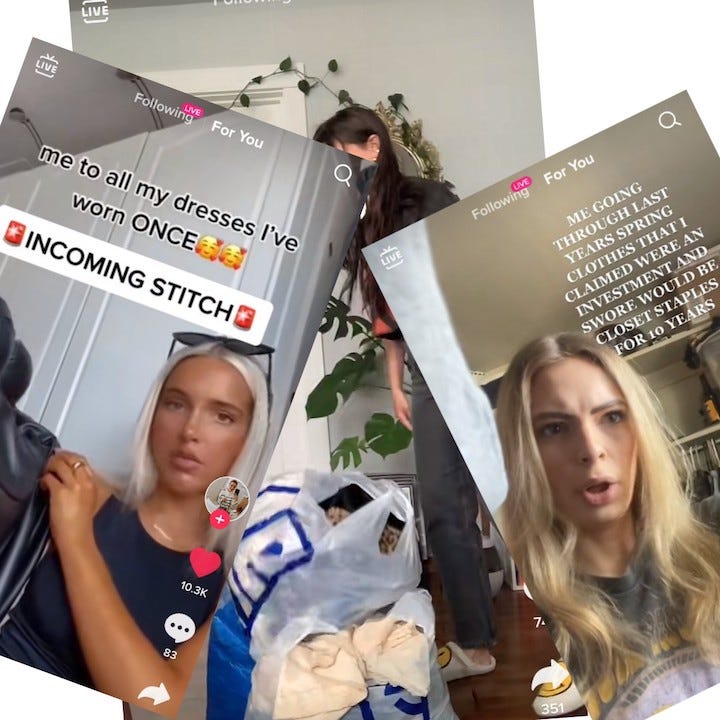TikTok has given me the shopping ick
Fast-moving trends and excessive shopping hauls dominate many For You Pages.
Embedded is your essential guide to what’s good on the internet, from Kate Lindsay and Nick Catucci.
Anyone who’s had to move at least once in New York City already knows they have too much stuff. —Kate
In the past six months, I made some radical (for me) changes when it comes to sustainability. It started small, with a reusable coffee cup and silicone stasher bags. A few weeks later, I was sitting on my floor, muttering to myself and cutting an old bath towel into squares to use instead of paper towels. Now, I’m stomping my food waste to the compost and repeatedly mending my boyfriend’s $12 jeans as if I, alone, will stop clothes from piling up in landfills.
These practices aren't stemming from any kind of joy or passion—they're almost manic. The idea of even one disposable coffee cup in my trash can, multiplied by the almost eight billion people on earth, makes me start hyperventilating.
TikTok is to blame.
While I’ve written about the environmental activists of TikTok, YouTube, and Instagram before, it was the regular users that pushed me to this madness. Video after video of Amazon hauls, IKEA bags full of thrifted clothes, even Emily Mariko’s frequent use of parchment paper that she throws away after using in the microwave for one minute—it all added up on my screen in a way it hadn’t in real life, and I suddenly stopped: stopped buying clothes, stopped throwing things away, and started playing a game with my trash and recycling cans in which I see how slowly I can fill them.
“There's this idea that Gen Z is super sustainably-minded, they're out there like saving the world. And…that just simply is not true,” youth trend expert Casey Lewis told me in November. “The rate at which things are shifting and changing and happening is super high.”
I’ve started seeing this on my own feed as warmer weather returns and users realize the on-trend clothes they bought last summer are already dated. And yet, they’re still buying the latest Zara shirt in multiple colors, still following trends that they know first-hand will only last for a few months.
In the past this kind of behavior was framed as quirky, detrimental only to the finances of the person doing it. But at this point, we are well aware of overconsumption and waste, and TikTok is fueling that cavalier culture at the exact moment in time we should be doing all we can to reverse it.
The defense you'll find in the comments of these videos—and might be thinking as you read this—is that we should not be blaming individuals. This is generally true. The large companies that generate so much of the world's waste and pollution deserve the blame first. But for well-off or otherwise comfortable people, this mantra may be a convenient way to shirk having to make any kind of sacrifice or lifestyle change. The truth is this: The average American produces 82 pounds of textile waste each year, which adds up to more than 11 million tons of textile waste from just the United States—and this is just clothes. If there’s one thing we learned from the past two years, it’s that individual behavior, changed on a collective level, can make a world of difference, good and bad.
But sometimes things have to get worse before they can get better, and TikTok’s fast-moving trends and excessive shopping habits fueled something that may actually be important: backlash. I’m not the only one having this reaction, and enough people getting the ick and talking about it has resulted in a rise in videos pushing back against today's consumer culture.
Fashion writer Mady Lee recently did a post-mortem on “cheugy,” and how so many of the things that were deemed “out” just a year ago are already appearing back on runways.
“Just wear what you want,” she concludes.
In another video, creator @oldhotdogwater says influencers who do brand deals with fast fashion companies should not be respected, let alone normalized. Comments are turned off, so you can guess how that went over.
And in other cases, the backlash is as simple as this.
This isn’t about making sustainability a “trend” that fades in and out as quickly as the latest viral term, but knocking overconsumption, thoughtless waste, and other unsustainable behaviors out of the cycle forever, and off the For You Pages that incite the anxiety and demand that fuels this consumption in the first place.





